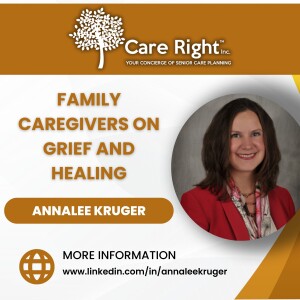
407
Downloads
90
Episodes
Family caregivers across the nation are finding themselves thrust into the role of caring for aging loved ones without ever having any family discussion about the ”what is” of aging. Families are not talking about care needs, caregiver burnout, the costs of care, dementia, other disease progressions, and they aren’t putting proactive plans in place. If you find yourself in this predicament, you need to listen to our ”Tired” podcast series
Episodes

Tuesday Aug 27, 2024
Family Caregivers on Grief and Healing
Tuesday Aug 27, 2024
Tuesday Aug 27, 2024
Dealing with grief is an unavoidable part of caregiving and aging, but it's a topic that many people find hard to talk about. Grief can arise from the loss of loved ones or the changes that come with aging, making it a complex and emotional experience. Many caregivers and individuals struggle to express their feelings and seek support. Addressing and discussing grief openly can help ease the burden and provide comfort during challenging times.
Annalee Kruger, the founder of Care Right Inc., hosts a discussion with several women who will share their personal experiences with grief. They cover topics such as the challenges of unexpected loss, caring for loved ones with dementia, and the importance of having open conversations about grief and end-of-life planning. They discuss both helpful and unhelpful responses they have received from others during their grief journeys. Stay tuned!
Quotes:
- “Grief is the price we pay for love." - Mary Lynch
- “COVID lockdowns took a lot away from those of us who would normally have been able to be there.” - Annalee Kruger
- “You're a caregiver, no matter where your loved one lives. You are still a caregiver.” - Annalee Kruger
Takeaways:
-
Consider recording interviews with elderly family members about their lives and memories to preserve their stories and legacy.
-
Reach out to others grieving significant dates like anniversaries with messages of support, as the grief can resurface unexpectedly.
-
Have open and honest end-of-life discussions with loved ones to ease the burden on family members after death.
-
Be mindful of unhelpful responses to grief, such as minimizing the pain, making comparisons, or offering insensitive comments. Instead, focus on listening, offering practical help, and providing emotional support.
-
Extend grace to both the grieving person and the person who has passed, recognizing that everyone did the best they could at the time.
Conclusion:
Grief is a deeply personal and complex experience, with individuals facing a wide range of emotions and challenges based on their unique circumstances of loss. Understanding that each person's journey through grief is different is crucial for providing appropriate support. Recognizing and respecting these diverse experiences can help individuals navigate their emotional journey more effectively.

No comments yet. Be the first to say something!